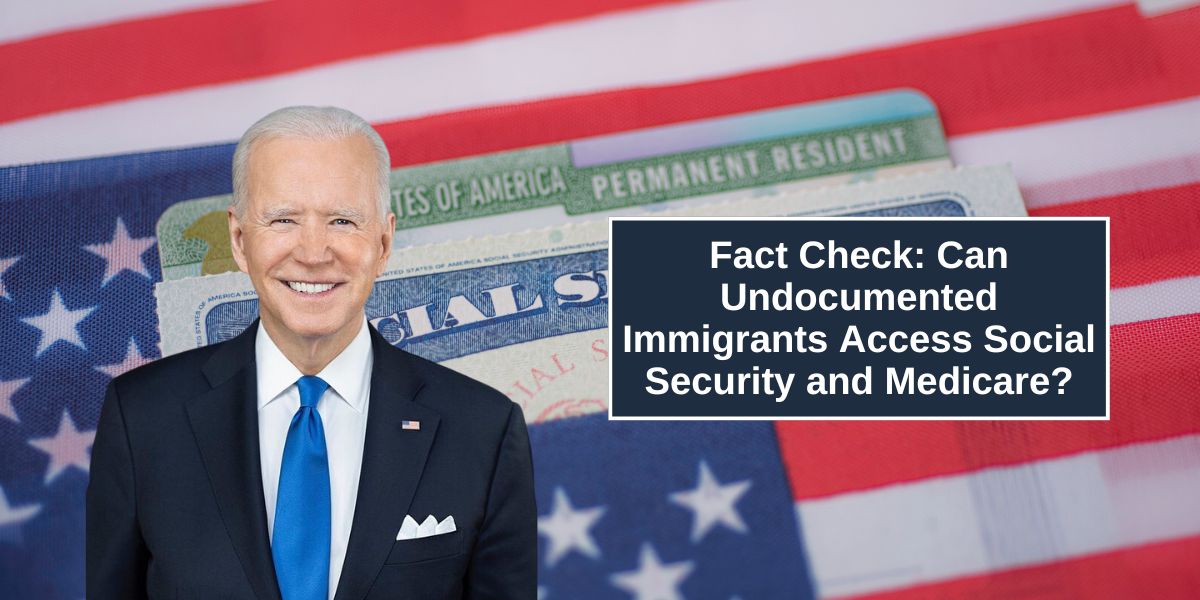In the ongoing debate over U.S. immigration policies, a common question is whether undocumented immigrants can access Social Security and Medicare benefits.
This topic frequently surfaces in political discussions, social media, and news coverage. To clarify the situation, it’s important to examine the facts, legal frameworks, and any exceptions that govern access to these vital federal programs.
Table of Contents
Understanding Social Security and Medicare
What Are Social Security and Medicare?
Social Security and Medicare are two of the most important federal programs in the United States, offering financial and healthcare support to eligible citizens and legal residents.
- Social Security: This program provides retirement, disability, and survivor benefits, funded through payroll taxes collected under the Federal Insurance Contributions Act (FICA).
- Medicare: This federal health insurance program primarily serves individuals aged 65 and older, as well as younger people with disabilities. It is funded through payroll taxes specifically designated for Medicare.
| 300 Reduction In Social Security Benefits |
|---|
| Thinx Lawsuit Class Action Payment 2024 |
| Johnson And Johnson Lawsuit 2024 |
| Canada 300 Federal Payment Announced |
| Ontario Teacher Pension Plan |
Eligibility Criteria for Social Security and Medicare
Social Security Eligibility
To qualify for Social Security benefits, individuals must meet the following criteria:
- Work Credits: Applicants need to accumulate a minimum number of work credits, usually earned through approximately 10 years of employment where Social Security taxes were paid.
- Legal Status: Social Security benefits are available only to U.S. citizens and lawful permanent residents (green card holders). Certain non-citizens, such as those with valid work visas or those covered under specific international agreements, may also qualify.
Medicare Eligibility
Medicare eligibility also requires:
- Age or Disability: Medicare is available to individuals aged 65 or older, as well as younger individuals with qualifying disabilities.
- Work Credits and Legal Status: Similar to Social Security, Medicare requires sufficient work credits and lawful immigration status. Individuals who haven’t earned enough work credits may still qualify by paying higher premiums, but they must be legal residents.
Can Undocumented Immigrants Access Social Security and Medicare?
The Legal Framework
Undocumented immigrants are generally not eligible for Social Security and Medicare benefits. These programs are funded through payroll taxes, which require a valid Social Security Number (SSN) to contribute to the system.
Because undocumented immigrants lack a legal SSN, they cannot earn the work credits needed to qualify for these benefits.
Exceptions and Special Circumstances
While the general rule is straightforward, there are some nuanced scenarios:
- Temporary Protected Status (TPS): Individuals with TPS who are authorized to work and contribute to the Social Security system may eventually qualify for benefits.
- Deferred Action for Childhood Arrivals (DACA): Although DACA recipients can work legally and pay into Social Security, they are not eligible for Social Security benefits due to their temporary status.
- Use of ITIN: Some illegal immigrants can file taxes using an Individual Taxpayer Identification Number (ITIN). However, ITINs are used for tax purposes only and do not provide eligibility for Social Security or Medicare benefits or grant legal status.
The Myths and Misinformation
Common Misconceptions
A common misconception is that undocumented immigrants can easily access Social Security and Medicare. This myth often arises from confusion about tax contributions and benefits.
- Payroll Tax Contributions: Undocumented immigrants contribute billions of dollars annually in payroll taxes, often using false or borrowed SSNs. However, these contributions do not make them eligible for Social Security or Medicare benefits.
- Emergency Medicaid: Although undocumented immigrants cannot access Medicare, they may receive Emergency Medicaid for life-threatening conditions. However, this is not equivalent to Medicare.
Political and Social Implications
The argument over unauthorized immigrants and government benefits is deeply political. Some argue that excluding undocumented immigrants from benefits is justified by their legal status, while others emphasize the moral and economic implications of denying safety nets to a significant portion of the workforce.
The Reality of Undocumented Immigrants and Federal Benefits
What Benefits Are Accessible?
Undocumented immigrants have access to certain public benefits, though these are typically limited to emergency services and state-specific programs.
- Emergency Services: Undocumented immigrants can receive emergency medical care through Medicaid if they meet income eligibility criteria.
- State Programs: Some states provide limited benefits to undocumented immigrants, such as health coverage for children or prenatal care. These benefits are state-funded and vary significantly from one state to another.
Impact on Social Security and Medicare
The exclusion of undocumented immigrants from Social Security and Medicare does not negate their contributions to these programs.
Undocumented workers contribute billions of dollars to Social Security and Medicare without ever receiving benefits, sparking debates about the fairness and sustainability of this situation.
Social Security and Medicare Eligibility for Different Immigrant Groups
| Immigrant Status | Social Security Eligibility | Medicare Eligibility |
|---|---|---|
| U.S. Citizens | Eligible with sufficient work credits | Eligible with sufficient work credits |
| Legal Permanent Residents | Eligible with sufficient work credits | Eligible with sufficient work credits |
| Temporary Protected Status | May qualify if authorized to work | May qualify with sufficient work credits |
| DACA Recipients | Pay into system but not eligible | Not eligible |
| Undocumented Immigrants | Not eligible regardless of tax payments | Not eligible regardless of tax payments |
Conclusion
The idea that undocumented immigrants can access Social Security and Medicare is a myth. Although they contribute significantly through payroll taxes, their lack of legal status prevents them from receiving benefits.
Understanding these facts is essential for informed discussions on immigration and federal benefits. As the debate continues, focusing on the realities of the system and its impact on people is crucial.
FAQs
Can undocumented immigrants receive Social Security benefits?
No, undocumented immigrants are not eligible for Social Security benefits. To qualify for Social Security, individuals must be legal U.S. residents or citizens and have a valid Social Security number.
Are undocumented immigrants eligible for Medicare?
No, undocumented immigrants are not eligible for Medicare. Medicare is available only to U.S. citizens and legal permanent residents who meet specific age or disability requirements and have paid into the system through payroll taxes.






